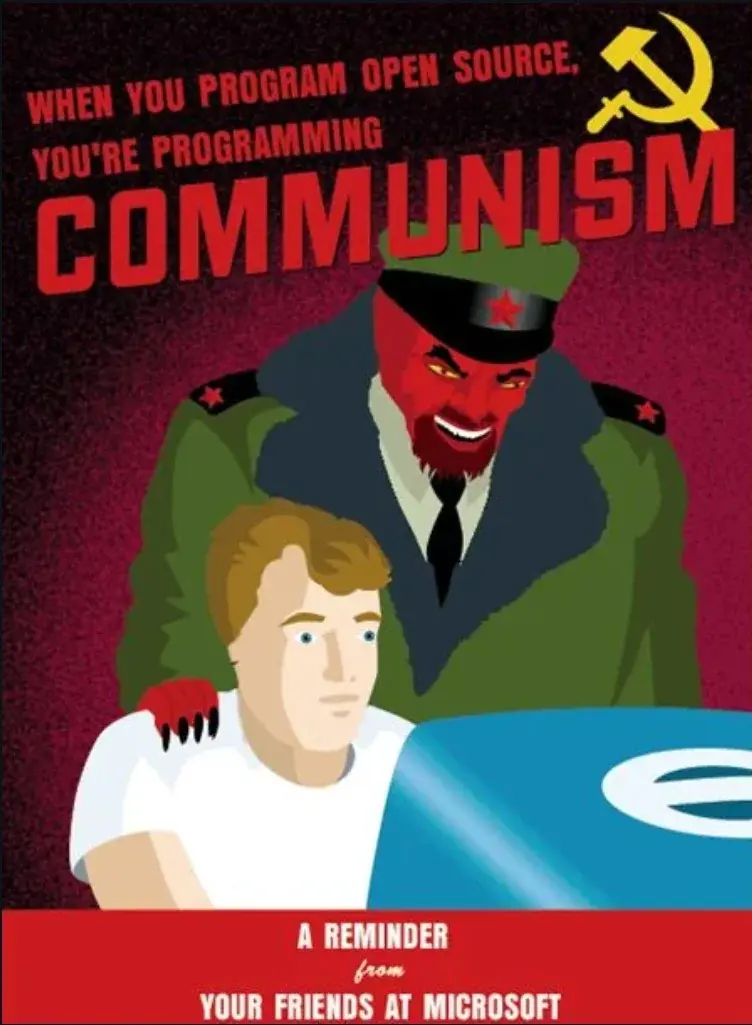this post was submitted on 29 Nov 2023
1358 points (97.4% liked)
linuxmemes
21234 readers
21 users here now
Hint: :q!
Sister communities:
- LemmyMemes: Memes
- LemmyShitpost: Anything and everything goes.
- RISA: Star Trek memes and shitposts
Community rules (click to expand)
1. Follow the site-wide rules
- Instance-wide TOS: https://legal.lemmy.world/tos/
- Lemmy code of conduct: https://join-lemmy.org/docs/code_of_conduct.html
2. Be civil
- Understand the difference between a joke and an insult.
- Do not harrass or attack members of the community for any reason.
- Leave remarks of "peasantry" to the PCMR community. If you dislike an OS/service/application, attack the thing you dislike, not the individuals who use it. Some people may not have a choice.
- Bigotry will not be tolerated.
- These rules are somewhat loosened when the subject is a public figure. Still, do not attack their person or incite harrassment.
3. Post Linux-related content
- Including Unix and BSD.
- Non-Linux content is acceptable as long as it makes a reference to Linux. For example, the poorly made mockery of
sudoin Windows. - No porn. Even if you watch it on a Linux machine.
4. No recent reposts
- Everybody uses Arch btw, can't quit Vim, and wants to interject for a moment. You can stop now.
Please report posts and comments that break these rules!
founded 1 year ago
MODERATORS
you are viewing a single comment's thread
view the rest of the comments
view the rest of the comments

That's a bad example, because at that point Yugoslavia couldn't have existed without Tito – he was an extremely authoritarian figure that cracked down on any sort of controversial thought hard. Having an intelligent dictator as the unifying force isn't a particularly good strategy, and Yugoslavia was bound to fail without an authority forcing it to stay together. There were many human rights violations done to keep the peace and equality in the nation.
Yugoslavia also wasn't exactly as "communist" as other communist countries, they allowed private ownership of property and business and relied a lot on surrounding capitalist countries to have a decent standard of living and economy.
You obviously never lived in Yugoslavia. I have. It was nothing like that. Western media presented him like every other dictator there is out there, which couldn't be further from the truth. Benevolent dictator, yes, that one he might have been, but an iron fisted one that went after everyone that so much as whispered something he didn't like? No, that's just not true.
That might be true to an extent. Slovenia and Croatia didn't like the federation, especially Sloveina... and yes, they were kinda forced into the federation after WWII. I would agree that Slovenia might have been better off if she was allowed to leave the federation. She should never have been a part of the federation anyway.
Croatia had a different problem. They wanted to be in the federation, but wanted to lead it. Tito had to balance. He was Croatian, so he had to put the capital in Serbia and pick most of the leading figures from the Serbs.
You have to understand, these regions were always riddled with nationalst wars. This was a chance for everyone to live peacefully, compromises had to be made. And we did live peacefully... up to a point.
Yes, Yugoslavia was socialist, and that was also up to an extent (as mentioned, private ownership and other things).
Though, the idea was to be completely autonomous. The relying on capitalist countries part was supposed to be a temporary solution. And things were heading in the right direction (more or less... not saying things couldn't have been done better), but tides shifted when Tito died and everything started falling appart. I could elaborate in more detail if you'd like, but I feel like it's enough for this comment.